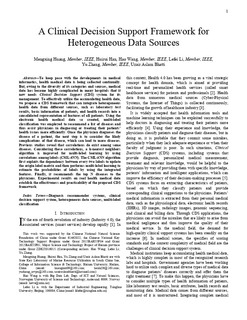| dc.contributor.author | Huang, Mengxing | |
| dc.contributor.author | Han, Huirui | |
| dc.contributor.author | Wang, Hao | |
| dc.contributor.author | Li, LeFei | |
| dc.contributor.author | Zhang, Yu | |
| dc.contributor.author | Bhatti, Uzair Aslam | |
| dc.date.accessioned | 2019-05-03T08:39:51Z | |
| dc.date.available | 2019-05-03T08:39:51Z | |
| dc.date.created | 2018-12-06T19:16:02Z | |
| dc.date.issued | 2018 | |
| dc.identifier.citation | IEEE journal of biomedical and health informatics. 2018, 22 (6), 1824-1833. | nb_NO |
| dc.identifier.issn | 2168-2194 | |
| dc.identifier.uri | http://hdl.handle.net/11250/2596415 | |
| dc.description.abstract | To keep pace with the developments in medical informatics, health medical data is being collected continually. But, owing to the diversity of its categories and sources, medical data has become so complicated in many hospitals that it now needs a clinical decision support (CDS) system for its management. To effectively utilize the accumulating health data, we propose a CDS framework that can integrate heterogeneous health data from different sources such as laboratory test results, basic information of patients, and health records into a consolidated representation of features of all patients. Using the electronic health medical data so created, multilabel classification was employed to recommend a list of diseases and thus assist physicians in diagnosing or treating their patients' health issues more efficiently. Once the physician diagnoses the disease of a patient, the next step is to consider the likely complications of that disease, which can lead to more diseases. Previous studies reveal that correlations do exist among some diseases. Considering these correlations, a k-nearest neighbors algorithm is improved for multilabel learning by using correlations among labels (CML-kNN). The CML- kNN algorithm first exploits the dependence between every two labels to update the origin label matrix and then performs multilabel learning to estimate the probabilities of labels by using the integrated features. Finally, it recommends the top N diseases to the physicians. Experimental results on real health medical data establish the effectiveness and practicability of the proposed CDS framework. | nb_NO |
| dc.language.iso | eng | nb_NO |
| dc.publisher | Institute of Electrical and Electronics Engineers (IEEE) | nb_NO |
| dc.title | A Clinical Decision Support Framework for Heterogeneous Data Sources | nb_NO |
| dc.type | Journal article | nb_NO |
| dc.type | Peer reviewed | nb_NO |
| dc.description.version | acceptedVersion | nb_NO |
| dc.source.pagenumber | 1824-1833 | nb_NO |
| dc.source.volume | 22 | nb_NO |
| dc.source.journal | IEEE journal of biomedical and health informatics | nb_NO |
| dc.source.issue | 6 | nb_NO |
| dc.identifier.doi | 10.1109/JBHI.2018.2846626 | |
| dc.identifier.cristin | 1640056 | |
| dc.description.localcode | © 2018 IEEE. Personal use of this material is permitted. Permission from IEEE must be obtained for all other uses, in any current or future media, including reprinting/republishing this material for advertising or promotional purposes, creating new collective works, for resale or redistribution to servers or lists, or reuse of any copyrighted component of this work in other works. | nb_NO |
| cristin.unitcode | 194,63,55,0 | |
| cristin.unitname | Institutt for IKT og realfag | |
| cristin.ispublished | true | |
| cristin.fulltext | preprint | |
| cristin.qualitycode | 1 | |
